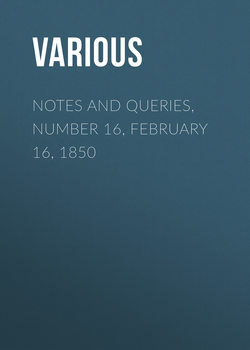Notes and Queries, Number 16, February 16, 1850

Реклама. ООО «ЛитРес», ИНН: 7719571260.
Оглавление
Various. Notes and Queries, Number 16, February 16, 1850
NOTES
DANIEL DE FOE AND HIS GHOST STORIES
PET-NAMES
LACEDÆMONIAN BLACK BROTH
A HINT TO INTENDING EDITORS
NOTES UPON CUNNINGHAM'S HAND-BOOK OF LONDON
FOLK LORE
QUERIES
WHITE HART INN, SCOLE
PASSAGES FROM POPE
BELVOIR CASTLE
MINOR QUERIES
REPLIES
AELFRIC'S COLLOQUY, AND THE A.-S. WORD ÆGYPE IN THE A.-S. PSALTER
ANTONY ALSOP
REPLIES TO MINOR QUERIES
MISCELLANIES
MISCELLANEOUS
NOTES ON BOOKS, SALES, CATALOGUES, ETC
BOOKS AND ODD VOLUMES
NOTICES TO CORRESPONDENTS
Exhibition of Works of Ancient and Mediæval Art
Отрывок из книги
I feel obliged by your intelligent correspondent "D.S." having ascertained that De Foe was the author of the Tour through Great Britain. Perhaps he may also be enabled to throw some light on a subject of much curiosity connected with De Foe, that appears to me well worth the inquiry.
Mrs. Bray, in her General Preface prefixed to the first volume of the reprint, in series, of her Novels and Romances, when giving an account of the circumstances on which she founded her very graphic and interesting romance of Trelawny of Trelawne, says—
.....
Sir Walter Trevelyan's question is soon answered, for I presume the celebrity of Spartan Black Broth is chiefly owing to the anecdote of Dionysius related by Plutarch, in his very popular and amusing Laconic Apophthegms, which Stobæus and Cicero evidently followed; this, and what is to be gathered from Athenæus and Julius Pollux, with a few words in Hesychius and the Etymologicon Magnum, is the whole amount of our information. Writers since the revival of letters have mostly copied each other, from Coelius Rhodiginus down to Gesner, who derives his conjecture from Turnebus, whose notion is derived from Julius Pollux,—and so we move in a circle. We sadly want a Greek Apicius, and then we might resolve the knotty question. I fear we must give up the notion of cuttle-fish stewed in their own ink, though some former travellers have not spoken so favourable of this Greek dish. Apicius, De Arte Coquinariâ, among his fish-sauces has three Alexandrian receipts, one of which will give some notion of the incongruous materials admissible in the Greek kitchen of later times:—
This question Vexata it seems had not escaped the notice of German antiquaries. In Boettiger's Kleine Shriften, vol. iii., Sillig has printed for the first time a Dissertation, in answer to a question which might have graced your pages: "Wherewith did the Ancients spoon" [their food]? Which opens thus:—
.....